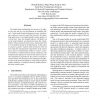Free Online Productivity Tools
i2Speak
i2Symbol
i2OCR
iTex2Img
iWeb2Print
iWeb2Shot
i2Type
iPdf2Split
iPdf2Merge
i2Bopomofo
i2Arabic
i2Style
i2Image
i2PDF
iLatex2Rtf
Sci2ools
104
click to vote
DATE
2003
IEEE
2003
IEEE
Transforming Structural Model to Runtime Model of Embedded Software with Real-Time Constraints
The model-based methodology has proven to be effective for fast and low-cost development of embedded software. In the model-based development process, transforming a software structural model that describes the underlying application, to an implementable runtime model is a critical issue. Since the designed software will finally run on the target platform, non-functional issues like schedulability, timing constraints and resource requirements have to be considered during the transformation. In this paper, we propose a generic runtime model architecture that can best satisfy the non-functional requirements of the system, and a generic transformation method to convert a structural model to a runtime model in such an architecture. The transformation approach is based on the notion of end-toend computations performed by the system in response to external stimuli. We demonstrate the advantages and effectiveness of the proposed method by constructing a software runtime model for a combined...
Related Content
| Added | 04 Jul 2010 |
| Updated | 04 Jul 2010 |
| Type | Conference |
| Year | 2003 |
| Where | DATE |
| Authors | Sharath Kodase, Shige Wang, Kang G. Shin |
Comments (0)

